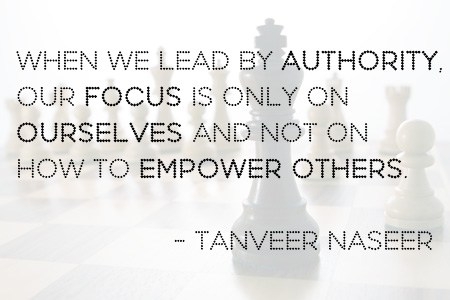Is Your Leadership Based On Influence Or Authority?

By Tanveer Naseer
It’s only natural that there are different schools of thought and perspectives on what would be the best way to lead your team and organization forward. Of course, while there might be different approaches to leadership, there are still a few binary aspects to how we approach the role of leader in today’s organizations.
One example is the choice between the command-and-control style of leadership and one that’s more collaborative and inclusive in how we rally people around a common cause or goal. While most of us have come to appreciate the limitations and inefficiencies that come with a top-down style of leadership, one binary approach to leadership that’s not so clear is the one where we choose either to rely on our authority or on our influence to guide our team or organization.
Now to be clear, leaders by default do operate with some form of authority, usually as a result of their position within their organization. Where problems arise is when we think that all a person needs to lead others is a sense of authority without any consideration for the impact our actions have on those we have the responsibility to lead.
To help illustrate what I mean by this, I’d like to share the example of two people I worked with during my clinical-work days at the Royal Victoria Hospital in Montreal.
Irene was a member of the nurses team that the doctors and my fellow clinicians collaborated with in our work treating the various patients that came to our hospital-based clinic. Although this team of nurses didn’t have a head nurse, Irene liked to think of herself as being the head nurse and certainly liked to act like she had that weight to throw around in her interactions with both fellow staff and patients.
Now while there was no question that Irene was a competent and caring nurse, it was clear talking to her fellow nurses that if a head nurse job were to be created and Irene were to get it, and the nurses would be lining up at the HR department with requests to transfer to another department.
The problem Irene had is that while she was certainly technically competent as a nurse, she had little to no influence in terms of people wanting to follow her advice and suggestions.
In fact, it was so bad that there were a few occasions where I saw Irene give some unsolicited advice about a particular case and her fellow nurses would outright ignore her. And if you asked the other nurses why they’d behave that way, they’d tell you about how they didn’t want to make Irene’s ego any bigger than it already was.
Now compare Irene’s example to Helen, another nurse who worked at this clinic. Helen was the nurse who everyone went to if they needed help with a particular problem or if you just needed a friendly ear to vent to about some difficult patient.
Helen was just as competent and caring a nurse as Irene, but the difference between these two professionals was that Helen made it all about the patient, while Irene was more interested in finding opportunities to showcase herself and her abilities.
While both nurses had the same level of authority in how they performed their jobs, time and time again when patients returned, it was Helen who received the most requests from patients to have her working on their case.
Now the reason why I wanted to use nurses who lack formal leadership titles to discuss this issue is in part because it’s a common adage that in today’s modern workplaces, anybody can be a leader; that we don’t need a title to wield influence within our team and organization.
But perhaps more importantly, Irene and Helen’s example also helps to illustrate a key finding from recent neuroscience studies that offer an important reality check for how effective we are in bringing out the best in those we lead.
Researchers have found that the relationship between power and perspective-taking is inversely correlated. In other words, the more power we have, the less effort we make to seek out and understand the perspective of others.
What’s more, studies has found that when we focus on our own accomplishments or responsibilities, we end up significantly reducing our perspective taking. And it doesn’t take much for this happen – experiments have shown that all it takes is 90 seconds of increasing someone’s perception of their power to dramatically reduce their ability to consider the perspective of others. And naturally, when one thinks of power, one views this in terms of their authority.
So what these findings prove is that when we lead only by authority, our focus is only on ourselves and not on how to empower others






